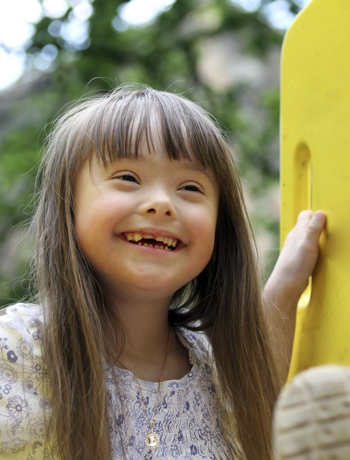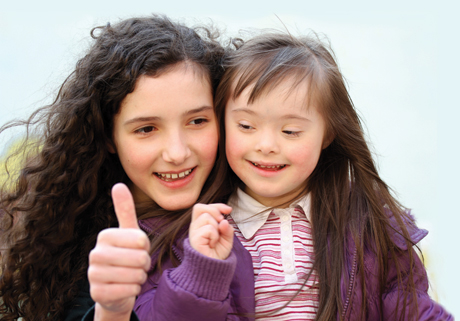
Sibling rivalry.
With those two words, my father diagnosed every screaming, kicking, fighting feud unleashed among us half-dozen kids. Even the smallest argument led him to declare in a deep, monotone voice: “Sibling rivalry. Looks like another case of sibling rivalry.”
Leading us to groan. And, inevitably, hash things out more quietly and reasonably.
Smart as my scientist/doctor father was, he never really addressed the strongest case of sibling rivalry in our family — the ambivalent feelings some of us harbored toward Johnny, our second-oldest brother, who had developmental disabilities.
Although my parents actively pushed for services for people with mental retardation (this was the 1960s and ’70s), they never addressed the family dynamics inside their own home.
As I reached adolescence, I experienced some of the emotions teens typically feel: resentment. Jealousy. Frustration. Anger. But unlike other kids, my moods weren’t simply teenage angst — they revolved around my brother.
My mother and brother were inseparable until he moved to a group home at age 32. He went everywhere she went: the grocery store, the bank, the drugstore, gas station, even to my doctor’s and dentist’s appointments. He stood out: 6 feet tall, dark hair, thick eyeglasses, perpetually dressed in jeans and a sweatshirt, with a garbled voice most people couldn’t understand.
He knew a lot about the things he liked: engines, natural disasters, trains, how record players worked. He learned to read at a grade-school level, cook his favorite food (hamburgers) and take buses to his job refurbishing tables and chairs.
Growing up, I also felt incredibly alone, as if I was the only little sister in the world with an odd older brother who couldn’t write, drive or be left alone to babysit.
Young siblings of children who need a myriad of medical, social and therapy support often feel jealous and resentful about being the “not so special child.”
And teens with special-needs siblings may feel they’re being called upon to be mature beyond their years, says Rachel Simon, a best-selling author who grew up in a family of four, which includes Beth, who has developmental disabilities. Simon’s 1999 book, Riding the Bus with My Sister, details the year she spent discovering the many friendships her sister formed while riding city buses in a Pennsylvania city. She said her sense of responsibility for Beth intensified in her 20s when her friends were free to “goof off.” She remembers thinking, “How can they be so carefree and foolish?”
Experts say children growing up with a sibling with special needs often reflect the way their parents cope. If the parent is handling things well, the kids will, also. But, Simon says, people often forget that adults have the advantage of perspective. Young brothers and sisters, on the other hand, have not experienced a “before” and “after.” They only know the “now.” And that now can seem unfair, uncompromising and downright difficult.
More help today
These days, families such as the one I grew up in can draw on more support and resources, especially in Washington state. In fact, this region has been a leader in creating innovative programs replicated across the country and globe. Three of these — Parent to Parent, Sibshops and Washington State Fathers Network — have helped tens thousands of families for more than three decades.
According to the 2010 U.S. Census, about one in five Americans has a disability. Among 53.9 million schoolchildren ages 5 to 17, 2.8 million (5.2 percent) have a disability requiring an individualized education plan (IEP), a federally mandated program that is followed after a child is assessed for skills and ability. The number of schoolchildren with special needs in Washington state is comparable to the national rate.
The term “special needs” has evolved to include individuals with intellectual disabilities, people with physical limitations and those with disorders or syndromes that affect their ability to move, communicate, learn, care for themselves or live independently. Included under the special-needs label are cerebral palsy, attention deficit hyperactivity disorder (ADHD), hearing and visual loss, seizures, stuttering or stammering, learning disorders, developmental delays and autism.
The number of children diagnosed with learning disabilities increased 17 percent from 1997 to 2008, the Centers for Disease Control and Prevention reports, while the rate of ADHD among kids increased by one-third, with boys twice as likely to be affected as girls.
What else has changed? Today, more people understand that when a child is diagnosed with a lifelong disability or disorder, everyone in the family is affected.
“Parents get overwhelmed with the whole diagnosis,” says Susan Atkins, director of Parent to Parent, a statewide program run by Arc of Washington, a nonprofit advocacy organization for individuals with developmental disabilities. “They often feel isolated and very stressed. They grieve for the child they thought they were going to have. And then they have to come to acceptance.”
Parent to Parent works like a mentorship, linking parents trained in special-needs issues with parents requesting assistance. It runs 18 chapters across the state and 12 different online chat groups, including one for grandparents.
Feeling the pressure
Tracey Gerhardt remembers anxiously peering at youngest daughter Rachel soon after she was born, wondering if she’d end up like her sister or become her sister’s keeper. Her older daughter, Anna, age 3 at the time, has autism.
“As soon as Rachel was born, I was looking for signs of autism,” says Gerhardt, who lives in Kirkland. As part of an experimental University of Washington (UW) study that’s trying to detect early signs of autism, Rachel was assessed beginning at 6 weeks old.
Gerhardt admits she started planning her youngest daughter’s life around her oldest daughter’s needs without knowing how Rachel would ultimately turn out. (Today, Rachel is a “typically developing” 10-year-old who once stated, at age 2, that she couldn’t wait to get older so she could “play” with Anna’s therapists.)
“I was thinking, ‘Oh, she’ll be able to take care of her sister.’ Then I realized, this kid isn’t even 3 months old and I’m already putting all this pressure on her.”
Atkins says it took her three years to accept the fact that her daughter, Alexa, had Down syndrome and wasn’t going to meet the usual childhood milestones.
These days, she’s in awe of what Alexa has accomplished. Now 30 years old, Alexa, who attended the Venture program at Bellevue Community College, works at Starbucks and Applebee’s and lives in an apartment. “She pushed us all the way through this journey,” Atkins says.
Amy Kocher of Kittitas County said she and her husband were “terrified” when their 2-month-old son, Kipp, was diagnosed with Chromosome Ring 18, a rare genetic condition. Kocher said all she could think about were the unknowns the disorder delivers: mental retardation, heart anomalies, kidney failure, blindness, deafness, low muscle tone, microcephaly and failure to thrive.
“I felt as though I was alone on a deserted island,” Kocher recalls. “Not one friend or relative could even come close to imagining the fear of the unknown that I felt. No words could comfort me. I was so terrified that my little beautiful baby would never know love.”
After making the initial phone call to Parent to Parent, Kocher met many families and learned from all of them. “Without these people, I may have fallen into a pit of helplessness,” she writes on the Parent to Parent website.
Sib sessions

Roseann Popa of Sammamish is mother to Andrea, 15, and Michael, 11, who was diagnosed with autism at age 3. Every year, Roseann and Andrea go away on a weekend together, just mom and daughter. It doesn’t have to be far (Bellingham this year) to be a special time for just the two of them.
Andrea also attends Sibshops, a Seattle Children’s program designed to help children and teens shed pent-up frustrations and feelings about living with a special-needs brother or sister. The three-hour-long sessions (some groups meet a few times a year, some bimonthly) allow kids to interact and discover they’re not alone. “Sibshops help Andrea deal with a ‘flavor of grief’; with feeling bad about the way things are,” Popa says. “You’re always trying to balance the needs of your kids.”
Erika Glas, 15, says the sib sessions help her understand and interact with her 12-year-old brother, Paul, who was born with Down syndrome. She’s been attending Sibshops since she was 6 years old.
“When I was younger, I’d yell, ‘I don’t want to go.’ Then in the afternoon, I’d say, ‘I don’t want to leave.’”
Without Sibshops, Glas, who lives in Seattle’s Ravenna neighborhood and attends Roosevelt High School, says, she would never have met Andrea Popa, now her best friend. Popa lives in Sammamish, attending 10th grade at Skyline High School.
“She gets it,” says Erika of Andrea. “I don’t have any friends at school who have a sibling with a disability.”
Don Meyer is director of the Sibling Support Project of the Kindering Center, a Bellevue-based early intervention center for disabled, medically fragile and vulnerable children. Meyer created Sibshops as a UW graduate student 35 years ago to fill a hole in social services for children with developmental disabilities. He’s spread the program to 425 locations in 10 countries by teaching others how to successfully engage children to talk about their brothers and sisters.
In an effort to get dads involved, Greg Schell created the Washington State Fathers Network, also housed at Kindering. It has grown to become one of the nation’s largest organizations devoted to fathers of children with special needs.
It can take some enticement to get dads talking, so chapters offer Poker Night, campouts and other activities to help the fathers ease into the subject.
“Dads don’t want to go to meetings, dads don’t want to open up, and dads don’t want to share their feelings,” says James Loaris, co-leader of the Snohomish Fathers Network, one of 16 statewide chapters.
These programs work. According to a 2005 UW survey, more than 90 percent of Sibshop graduates, ages 18-34, report the program has had a positive effect on the feelings they have for their siblings. In a separate UW/Bothell study of 146 Fathers Network participants, 97 percent said their involvement decreased their anxiety, 67 percent said “feelings of joy” had increased, and 69 percent reported more enthusiasm for their child.
Loaris and his wife, Amanda, are raising four children in Marysville. Two of the children have profound developmental disabilities. He describes his life as “100 percent different” from any family he knows with “typically developing” children. He and his wife, who both work, split caretaking duties, which means they seldom do anything together as a whole family. His oldest son plays soccer, but both parents can’t be at a game at the same time.
“I don’t remember the last time the whole family did something together,” he says. “We don’t even eat together, because each child is on a different diet.”
He and his wife average four hours of sleep a night. Still, he’s not too tired to plan and attend Fathers Network gatherings — they give him a much-needed boost.
“Sometimes, we just need help getting through another day,” Loaris admits. “Other times, we may have a new insight to share. Just to be able to talk to other fathers with similar needs and problems helps. The guys just get it.”
Patricia Guthrie is a freelance writer living in Shoreline.
RESOURCES
Parent to Parent
Connects parents of children with special needs
State coordinator: Susan Atkins
800-821-5927
Sibshops
Helps brothers and sisters of siblings with special needs
Sibling Support Project
A Kindering Center Program
Director: Don Meyer
206-297-6368
Washington State Fathers Network
For dads of kids with special needs
A Kindering Center Program
Director: Greg Schell
425-653-4286









